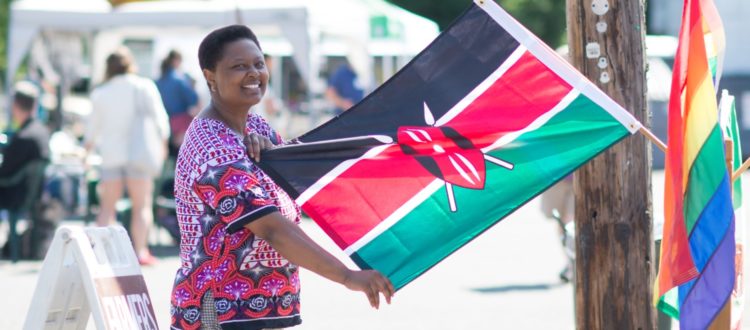At Home with Spice of Africa
For years, fans of Wambui Machua, the chef-owner of Spice of Africa, encouraged her to open a restaurant. Her samosas, stews, and other Kenyan treats are farmers market favorites, and her culinary presence in Portland has only grown since she started catering and teaching African cooking in 2008. In late February, just weeks before a global pandemic shut down Portland’s restaurant industry, she finally opened her first brick and mortar, only to see it temporarily close. There was no playbook for how to keep going, but because Portland Farmers Market remained open as an essential service–and a major revenue stream for Machua’s family business–she’s managed to keep it all going and even added a new venture: virtual African cooking classes.
On a recent Saturday evening, eight squares lit up a Zoom screen, each of us with our kitchens as a backdrop, ready to learn the secrets of Spice of Africa’s best-seller: the samosa. “We started with one goal in mind, to educate about our food and culture,” her website states, and the virtual class is no exception. She starts right off explaining that “In Kenya, we would eat this filling mixture separately with rice and chapati (unleavened flatbread which is also the subject of an upcoming class). “Most of the samosas people eat in Kenya are in restaurants–not necessarily people’s homes–because they think it is too time-consuming, especially because we don’t have the (premade) wraps, which if they are available are very expensive,” she explains. “We knead our own dough from scratch, that is what I did growing up. So they’re only for special occasions.”
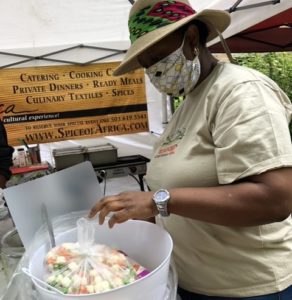
Chef Machua assembles the samosa kits
She returned to Portland to study for a degree in Business Management and put down roots, starting cooking classes at Portland Community College as well as a family. Her connections to Kenya are still strong, from direct sourcing ingredients to philanthropy. In early 2016 she and her teenage daughter spent four months back in Gachie, distributing over 40,000 books and school supplies in partnership with the Beaverton Rotary Club. They set up a community library, kitchen, and sewing project to stimulate economic development. Some of these creations are available for purchase on the Spice of Africa website.
Until recently she grew most of the produce needed for teaching and catering on a large plot in SE Portland, but with the addition of a new restaurant, it’s no longer feasible to grow crops too. “This is from Gathering Together Farm,” she explains on a recent Saturday morning, as she chops up a head of romaine lettuce, pointing with the tip of her chefs’ knife up the Park Blocks towards their booth. “Being at the farmers market enables me to make connections with local farmers from whom I can buy bulk produce.”
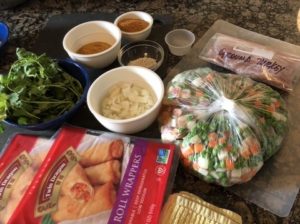
Everything included but the stove and the pot!
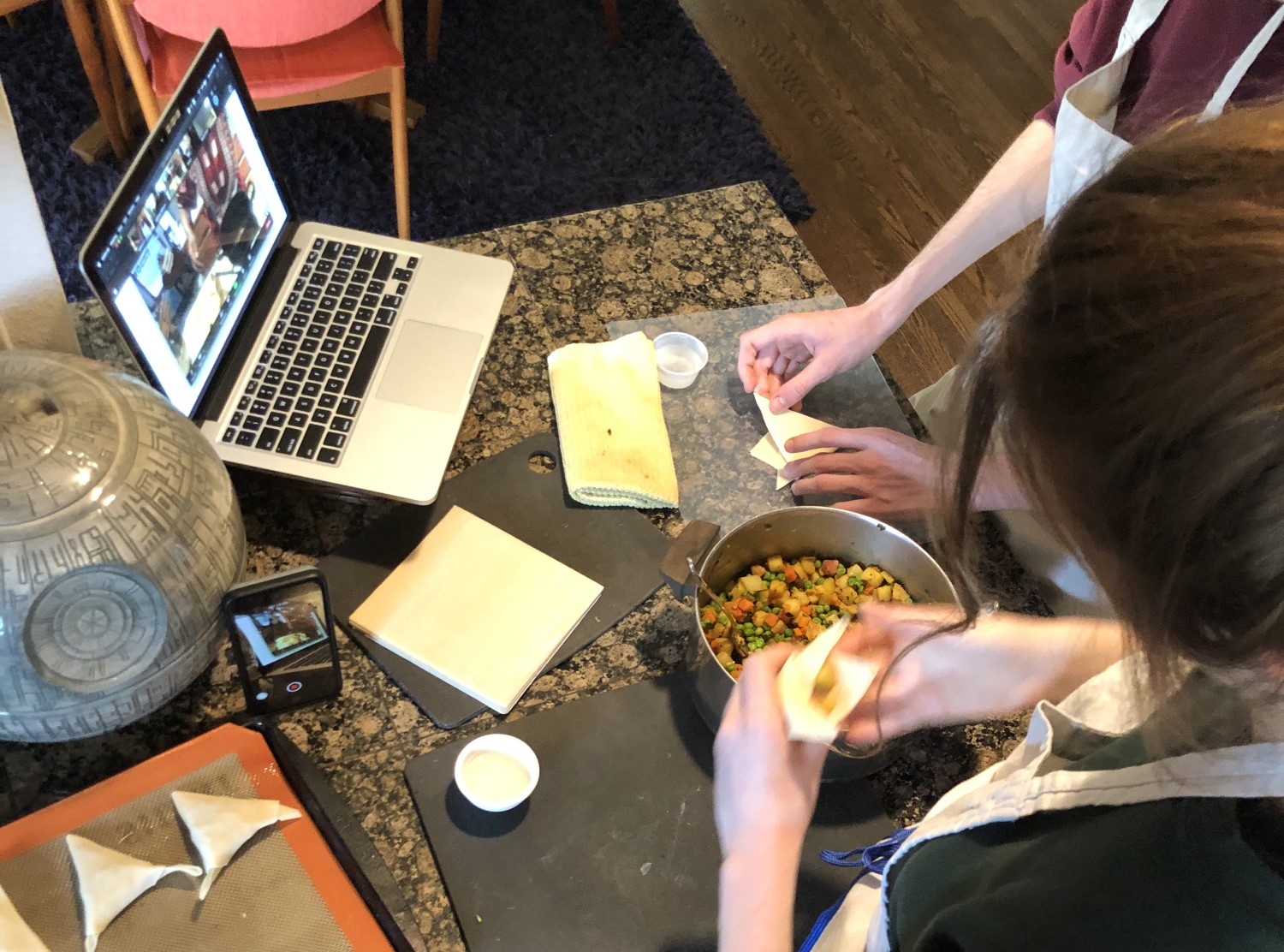
With Chef Machua’s expert guidance, anyone can make a great samosa!
Sustainable tips on how to freeze samosas (after they’re cooked is best), what to make with the extra seasoning, how to maximize the leftover oil, and reheating, were all covered in the class along with the more technical aspects, or what she calls African Origami. From her bright and airy home kitchen she checks in with every participant on screen, every step of the way, and doesn’t move on until we’ve signaled a thumbs up.
“It shouldn’t look frumpy–you want a nice little healthy samosa!” she coaches with a laugh, but my protruding “ears” were a little wonky looking until about the third go. “I’ve seen some funny samosas made in the class,” she adds. With that in mind, we’re encouraged to hold our creations up to our computer cameras for inspection. More thumbs up, then a little downtime while we all sample our newfound skill. She promises that “after today you are going to be the hit of every party you go to with these.” I believe her.
For a moment, as if by magic, the market is in our kitchen, as my teenage son and I eat standing up, sharing a bite next to a stranger–albeit virtually–as the aroma of spices of Africa in the air. It’s easily the best Saturday night we’ve had in socially-distanced months.
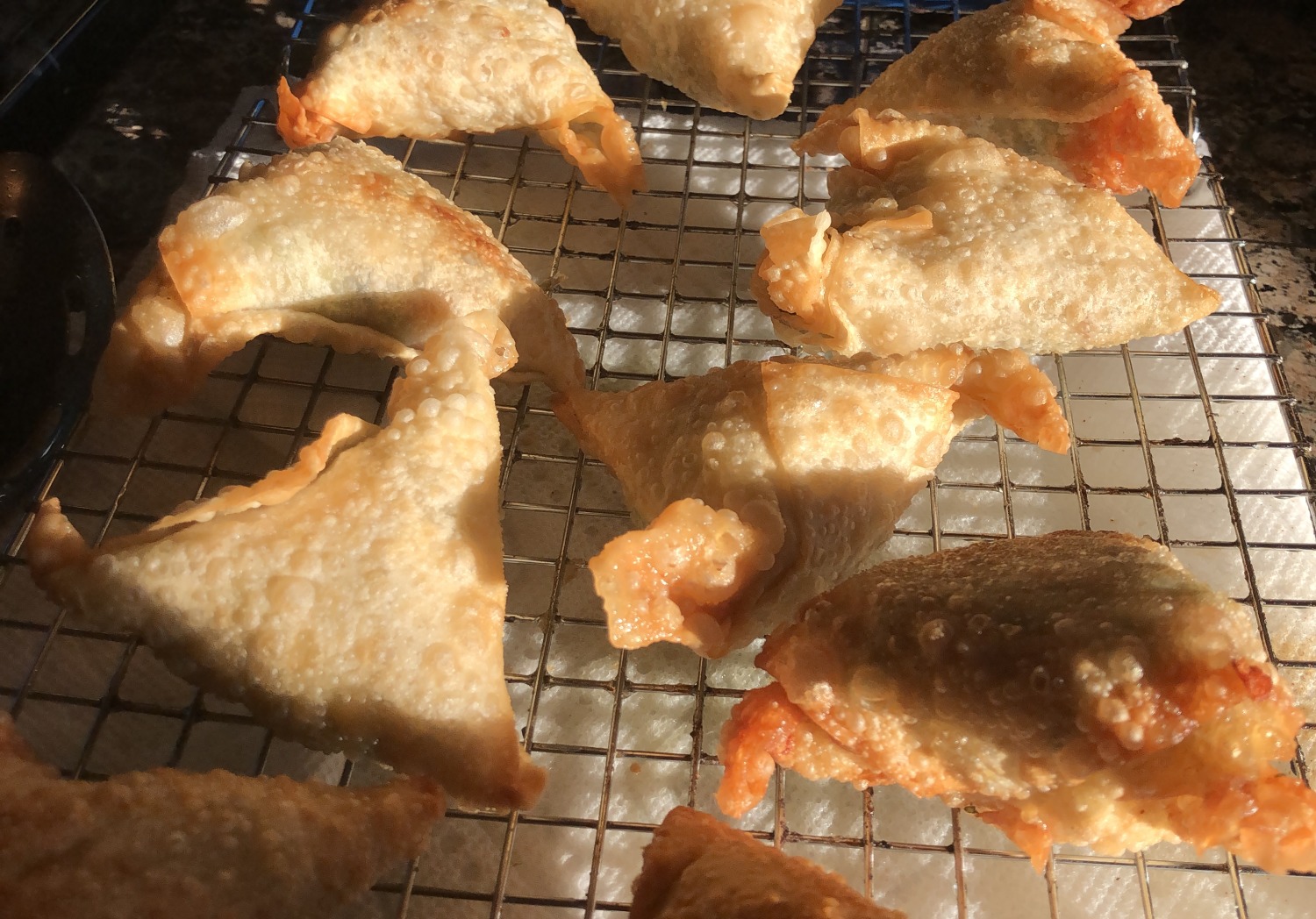
The finished product: Can’t you almost smell them through the screen?
Connections to a culture are often parlayed from the kitchen table and Chef Manchua confidently weaves her way into every avenue available to share her passion, as this recent evolution proves. “It’s been quite the journey, building it and seeing it grow,” she says of her business. “I really love cooking classes,” she confides, “they come naturally to me.” Her love of cooking and ease in front of the camera is evident: the former comes from over a decade of teaching both in her kitchen, at community colleges, and for parties; the later from her time as a model on television and the runway. (Food Network producers take note.)
It’s hard to believe that Chef Machua had not sold prepared food directly to the public until she became a vendor at the Portland Farmers Market (PFM), a little over two years ago. She believes that PFM and its small business incubator program was a crucial and instrumental part of her success. “I’m completely and utterly humbled by the love and support that Portland Farmers Market has for their vendors, and my customers who love my food and tell me so. It has changed my world. We had an amazing year at the markets in 2019, which catapulted us into being able to open the restaurant.” She was recently featured as a Culture Keeper with the Oregon Folklife Network, she’s a member of the Female Founders Collective, and just received certification as a Minority and Women Business Enterprise (M/WBE), allowing for access to government contracts and opportunities.
Our samosa kit also came with a gift card for prepared food from the restaurant, now reopened in the Morrison Market (a new food hall in SE Portland’s Goat Blocks, which features multiple food stalls centered around a courtyard bar). Here you can find the samosas, fish curry, Ethiopian lentil stew with traditional berbere seasoning and a range of rotating specials, all inspired by what our area farms have on offer. Not to miss is her Kenyan Chai, steeped to order with masala spices and Kenyan tea leaves, served hot or on ice. Orders can be placed ahead, by phone, or on the Spice of Africa website, where you’ll find a complete list of upcoming virtual classes, philanthropic events, and her new blog Cook, Spice, & Eat! And of course, you can still find Wambui and her delicious food every Saturday at the PSU Farmers Market in the north side hot food area.

